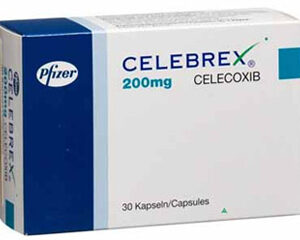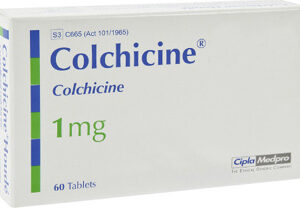Medication Overview
Colchicine is an alkaloid medication primarily directed towards the treatment and prevention of gout attacks or flares. Derived from the Autumn crocus plant, it serves an anti-inflammatory function and is also prescribed for managing familial Mediterranean fever, a hereditary inflammatory disorder. Its efficacy stems from its ability to obstruct the inflammatory response by hindering the migration of white blood cells to inflamed areas, reducing swelling and alleviating pain.
Indications and Usage
Colchicine is utilized in the abatement of gout, marked by intense joint pain and swelling. It is also indicated for the prophylaxis of gout flares and the management of familial Mediterranean fever. Although not a first-line treatment for pericarditis, it is sometimes prescribed for this condition as well.
Dosage and Administration
Dosing of colchicine must be personalized based on the condition being treated and the patient’s kidney and liver function. Commonly, for acute gout flares, colchicine may be administered at a higher initial dose followed by lower doses until the flare subsides. Long-term prevention of gout or familial Mediterranean fever involves much smaller daily doses. It’s essential to adhere strictly to the guidelines provided by healthcare professionals to prevent toxicity. For optimal absorption, colchicine is best taken without food.
Contraindications
Patients with renal or hepatic impairment should not take colchicine or should be closely monitored if treatment is necessary. Colchicine is also contraindicated for those with hypersensitivity to the drug or those who are currently undergoing treatment with certain other medications that could heighten colchicine’s toxic effects.
Warnings and Precautions
Colchicine has the potential to trigger serious side effects and toxic reactions, especially if incorrectly dosed. Muscle weakness, numbness, or pain could be indicative of colchicine toxicity. Blood dyscrasias, such as aplastic anemia and agranulocytosis, although rare, can occur. Therefore, monitoring of blood counts is advised. Caution should be taken in patients with gastrointestinal, renal, or cardiac diseases.
Drug Interactions
Colchicine’s impact can be amplified when taken concomitantly with drugs like statins, certain antibiotics, antifungal agents, and inhibitors of CYP3A4 – a significant pathway for colchicine metabolism. These interactions have the potential to exacerbate muscle damage and increase susceptibility to toxic effects. It is crucial to discuss all medications and supplements with a healthcare provider when on colchicine treatment.
Adverse Reactions
Adverse effects associated with colchicine can range from gastrointestinal disturbances such as nausea, vomiting, and diarrhea, to more severe reactions like myopathy, neutropenia, and neuropathy. In case of any persistent or worrying symptoms, it is imperative to seek medical attention.
Pregnancy and Lactation
Colchicine’s safety during pregnancy has not been conclusively established, so it should be used only when clearly needed and when the benefits outweigh the risks. Given that colchicine is excreted in human milk, caution is recommended when administering to nursing mothers, and the pros and cons must be carefully weighed.
Pediatric Use
The efficacy and safety profile of colchicine for pediatric patients is not fully understood, particularly for children under four years old. However, it is sometimes prescribed for familial Mediterranean fever in this group under strict medical supervision.
Geriatric Use
Elderly patients are generally more prone to experiencing the adverse effects of colchicine due to potential age-related decreases in renal function. Accordingly, lower dosages or increased monitoring may be necessary.
Overdosage
Overdose of colchicine is a grave concern and can be life-threatening, presenting with vomiting, diarrhea, hypotension, and respiratory issues. In such instances, immediate medical treatment is mandatory, with supportive and symptomatic care being the cornerstone of management.
Pharmacology
Colchicine’s mechanism of action involves impeding microtubule polymerization and disrupting the mobility and activity of neutrophils, ultimately diminishing inflammation. The medication has a variable absorption rate after oral administration and distributes extensively into body tissues. It is metabolized in the liver and predominantly excreted in the feces.
Clinical Trials
Clinical studies support colchicine’s efficacy in the prevention and interruption of acute gout flare-ups. Additional trials suggest benefits for patients with familial Mediterranean fever and also hint at colchicine’s capacity to reduce the incidence of recurrent pericarditis.
Storage and Handling
Colchicine should be stored at room temperature, away from light and moisture, and kept out of reach of children. Tablet integrity is important for efficacy, so damaged or broken pills should not be consumed.
Patient Counseling Information
Patients must be informed about the potential risks of colchicine, including the importance of strictly adhering to prescribed dosages and understanding the possible signs of toxicity. Diet, pregnancy intentions, and comprehensive medication history should all be shared with healthcare providers.
Manufacturer Information
Various pharmaceutical companies manufacture colchicine under different brand names. For specific product information, one should refer to the labeling distributed by the individual manufacturer.
References
Authoritative resources including clinical pharmacology texts, treatment guidelines for gout and familial Mediterranean fever, as well as medical journals provide extensive information on colchicine’s use, mechanism, and safety profile. These should be consulted for in-depth understanding and current practices.




Reviews
There are no reviews yet.